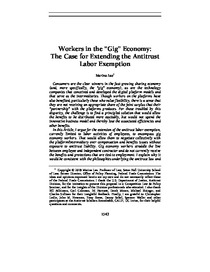Workers in the ‘gig economy': the case for extending the antitrust labor exemption

2018
51
1543-1587
digital economy ; sharing economy ; self employed ; labour law ; workers rights ; employment status
Law
English
"Consumers are the clear winners in the fast-growing sharing economy (and, more specifically, the “gig” economy), as are the technology companies that conceived and developed the digital platform models and that serve as the intermediaries. Though workers on the platforms have also benefited, particularly those who value flexibility, there is a sense that they are not receiving an appropriate share of the joint surplus that their “partnership” with the platforms is producing. For those troubled by this disparity, the challenge is to find a principled solution that would allow the benefits to be distributed more equitably, but would not upend the innovative business model and thereby lose the associated efficiencies and other benefits.
In this Essay, I argue for the extension of the antitrust labor exemption, currently limited to labor activities of employees, to encompass gig-economy workers. That would allow them to negotiate collectively with the platform/intermediary over compensation and benefits issues without exposure to antitrust liability. Gig-economy workers straddle the line between employee and independent contractor and do not currently receive the benefits and protections that are tied to employment. I explain why it would be consistent with the philosophies underlying the antitrust law and the exemption to extend the exemption to gig-economy workers, and why that can be reconciled with more recent refusals to apply the exemption to non-employee professionals -mostly independent physicians.
The Essay additionally addresses the drawbacks of different solutions proposed by others also concerned about the precarious circumstances of gig-economy workers, focusing in particular on a proposal to legislatively redefine “employment” broadly to cover gig-economy workers. My concern with this proposal is that it risks jeopardizing the very business model that has facilitated online intermediated work, and could also have the unintended effect of diminishing platform competition, which is troubling from a competition policy perspective. Given the uncertainties and risks, the simpler approach of extending the antitrust labor exemption to permit collective action by gig-economy workers, proposed in this Essay, seems to be the better path. ..."
Digital
The ETUI is co-funded by the European Union. Views and opinions expressed are however those of the author(s) only and do not necessarily reflect those of the European Union or the ETUI.